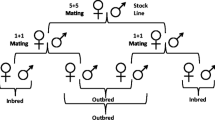Abstract
The authors of two influential accounts of the genetic consequences of mate choice consider that animals cannot produce fitter offspring by mating with a fitter than average individual1,2. Their main reason for this is that in a population at genetic equilibrium any genetic variation which affects fitness should not be heritable3. Other accounts have suggested ways in which mate choice might improve offspring fitness4. Data are now presented which show that one component of offspring fitness can be increased by mate choice in Drosophila melanogaster. The component of fitness measured was intraspecific competitive success during the part of the life history from first instar larva to adult fly.
Similar content being viewed by others
References
Maynard Smith, J. The Evolution of Sex (Cambridge University Press, 1978).
Williams, G. C. Sex and Evolution (Princeton University Press, 1975).
Falconer, D. S. Introduction to Quantitative Genetics (Longman, London, 1960).
Trivers, R. L. in Sexual Selection and the Descent of Man (ed. Campbell, B.) 136–179 (Aldine-Atherton, Chicago, 1972).
Simmons, M. J. & Crow, J. F. A. Rev. Genet. 11, 49 (1977).
Author information
Authors and Affiliations
Rights and permissions
About this article
Cite this article
Partridge, L. Mate choice increases a component of offspring fitness in fruit flies. Nature 283, 290–291 (1980). https://doi.org/10.1038/283290a0
Received:
Accepted:
Issue Date:
DOI: https://doi.org/10.1038/283290a0
- Springer Nature Limited
This article is cited by
-
Sexual Selection and Mate Choice: Insights from Neutralist Perspectives
Evolutionary Biology (2015)
-
Male Mate Choice for Unparasitized Females in Drosophila melanogaster
Journal of Insect Behavior (2015)
-
Rapid adaptation to mammalian sociality via sexually selected traits
BMC Evolutionary Biology (2013)
-
Intensive resistance by females before copulation induces insemination failure in the West Indian sweet potato weevil Euscepes postfasciatus
Population Ecology (2011)
-
Attractive males do not sire superior daughters
Evolutionary Ecology (2010)





